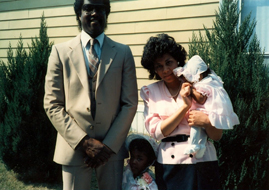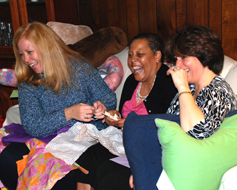
Last year I jokingly suggested to my mother that she get stoned for the first time in her life. She had been suffering in pain for years, battling a combination of Multiple Sclerosis and breast cancer, and that was the best option I had to offer. I clearly had no idea just how much she was suffering because two hours after my juvenile suggestion, she was dead. I watched her rapidly lose consciousness, take her last breaths, and eventually be wheeled out of our home by an undertaker whom I had called. I wrote her obituary, I delivered the eulogy at her funeral, and I watched as her casket was loaded into the back of a hearse. Unless my mother had secretly been Jesus Christ, she probably isn't coming back. And if she were Jesus Christ, I would probably disown her for never teaching me how to turn water into wine (a brilliant recession-proof business plan).
 Saturday is the official one-year anniversary of my mother's death and last week would have been her 50th birthday. This year, I decided that I would give up the grieving process for Lent. It is wretched, messy, and just plain miserable. I'm a typical, type-A personality who moves at a faster pace than most, so if experts say "the grieving process" is supposed to take about one year; I should have been done at least six months ago. Not to mention, misery does not look good on me. I was born with a smile on my face, and a year of grief is not my look of choice.
Saturday is the official one-year anniversary of my mother's death and last week would have been her 50th birthday. This year, I decided that I would give up the grieving process for Lent. It is wretched, messy, and just plain miserable. I'm a typical, type-A personality who moves at a faster pace than most, so if experts say "the grieving process" is supposed to take about one year; I should have been done at least six months ago. Not to mention, misery does not look good on me. I was born with a smile on my face, and a year of grief is not my look of choice.
By my high standards, I should definitely be finished with the intense fear of loss (who is going to die next?), the mood swings, and the unpredictable mini-nervous breakdowns that destroy even the most waterproof of mascaras. I should be fully prepared to move forward in life as a newly inducted member of the half-orphan club. Upon confidently coming to the conclusion that I had finally reached this cathartic crossroads, I was surprised to find that I was 110 percent wrong.
Apparently, the grieving process isn't something you just put in a box under your bed with your high school yearbooks. I've learned that the loss, just like some of those high school photos, continues to haunt you no matter how much time has passed. My mother has been gone for nearly a year, and I still find my characteristically sunny and sarcastic personality polluted with bits and pieces of rage, depression, and intense anxiety. My friends who are also members of this half-orphan society all describe this as "normal." I'm told that my feelings are a part of this "hole" that never really goes away when you lose a parent. I've been told that it gets better with time, but that I can expect these horrendously unpleasant emotions to plague me at the most inconvenient times for a while-a reality that I find positively maddening and completely unacceptable.
 I have decided that it's not really a "hole," it's more of a space. By definition, space is "the unlimited expanse in which everything is located." Having devoted so much time (roughly half of my life) to my mother when she was either sick or dying, a large part of my identity will forever be intrinsically tied to her, and that part of me is limitless. Today, the impulse to perpetuate her legacy is apparent, not only in my desire to serve others, and but also in my habit of buying expensive make-up. Ten years from now, it could come out in the way I choose to manage a couple of foul-mouthed, bratty kids. There will always be this space in which I must simply allow part of my identity to exist.
I have decided that it's not really a "hole," it's more of a space. By definition, space is "the unlimited expanse in which everything is located." Having devoted so much time (roughly half of my life) to my mother when she was either sick or dying, a large part of my identity will forever be intrinsically tied to her, and that part of me is limitless. Today, the impulse to perpetuate her legacy is apparent, not only in my desire to serve others, and but also in my habit of buying expensive make-up. Ten years from now, it could come out in the way I choose to manage a couple of foul-mouthed, bratty kids. There will always be this space in which I must simply allow part of my identity to exist.
Because space is limitless, I cannot attempt to place boundaries around my grief. She existed and is still so much a part of who I am, so I must allow her to occupy "space" whenever the need arises. There will be times when I will expect to miss her and will expect to grieve: when I get married, have children, or on her birthday. Other times, she is just going to pop up and I will have to make space to be sad, reflective, despise everyone who still has two great parents, or just do something that memorializes her in some way.
Physically, she left us last February; mentally, emotionally, and psychologically, she cannot be erased. Therefore I must acknowledge her, and for me this is the final stage of the grieving process: a never-ending state of unapologetic recognition. For me to not accept that this woman was the single most important person in my life would mean that she wasn't.
Acknowledgment means different things to different people, and for me it means I will always get manicures, wear sunglasses, love pearls, and drink champagne (especially at brunch). I will send people cards for no real reason, celebrate cheesy holidays, and bake amazing apple pies. I will always look for "common sense" ways to help those in need, I will go to church, and I will love getting dressed up. I will treat my friends like family, I will learn to let my father speak incessantly without rolling my eyes, I will listen to my mother's sister, and I will even be nice to my own sister. And when things are particularly difficult and ugly, even though I hate shopping, I will turn, just as she did, to retail therapy.
 Since I apparently cannot give up grief for Lent, I suppose this Ash Wednesday I will promise to live by the simple yet profound maxim that defined her life: do unto others as you would have them do unto you. And I will agree to leave myself space to grieve unapologetically, whenever I may need it, forever.
Since I apparently cannot give up grief for Lent, I suppose this Ash Wednesday I will promise to live by the simple yet profound maxim that defined her life: do unto others as you would have them do unto you. And I will agree to leave myself space to grieve unapologetically, whenever I may need it, forever.
And, perhaps most importantly, I will always simply do the best that I can (and look good doing it) because that is all she ever really expected anyway.